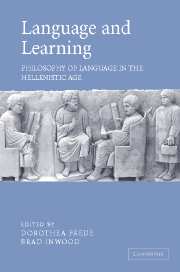Book contents
- Frontmatter
- Contents
- List of contributors
- Preface
- List of abbreviations
- Introduction
- 1 The Stoics on the origin of language and the foundations of etymology
- 2 Stoic linguistics, Plato's Cratylus, and Augustine's De dialectica
- 3 Epicurus and his predecessors on the origin of language
- 4 Lucretius on what language is not
- 5 Communicating Cynicism: Diogenes' gangsta rap
- 6 Common sense: concepts, definition and meaning in and out of the Stoa
- 7 Varro's anti-analogist
- 8 The Stoics on fallacies of equivocation
- 9 What is a disjunction?
- 10 Theories of language in the Hellenistic age and in the twelfth and thirteenth centuries
- References
- Index nominum et rerum
- Index locorum
6 - Common sense: concepts, definition and meaning in and out of the Stoa
Published online by Cambridge University Press: 23 November 2009
- Frontmatter
- Contents
- List of contributors
- Preface
- List of abbreviations
- Introduction
- 1 The Stoics on the origin of language and the foundations of etymology
- 2 Stoic linguistics, Plato's Cratylus, and Augustine's De dialectica
- 3 Epicurus and his predecessors on the origin of language
- 4 Lucretius on what language is not
- 5 Communicating Cynicism: Diogenes' gangsta rap
- 6 Common sense: concepts, definition and meaning in and out of the Stoa
- 7 Varro's anti-analogist
- 8 The Stoics on fallacies of equivocation
- 9 What is a disjunction?
- 10 Theories of language in the Hellenistic age and in the twelfth and thirteenth centuries
- References
- Index nominum et rerum
- Index locorum
Summary
The prevalence of philosophical appeals to universal agreement in ancient thought indicates that a limited notion of ‘common sense’ was around, at least implicitly, from the fourth century bc. But, despite the partial justification Aristotle gave for such appeals, a developed theory of common sense was not possible until the Socratic insight that rationality is in some sense constitutive of all adult human beings was adapted and elaborated by the Stoics. In this paper, I argue that the earliest theory of common sense in the ancient world was not this Stoic doctrine – the theory of the ‘common conceptions’ – but a transformation of it found in Cicero's later rhetorical works.
This transformation is part of a broader series of developments, from the Stoic understanding of common conceptions, and in the direction of ‘common sense’, in a variety of later philosophical and rhetorical traditions ranging from Carneades in the second century bc to Simplicius in the sixth century ad. Some of the earlier stages of this process seem relatively clear. Carneades initiated a sceptical attack on Chrysippus' theory of common conceptions, by reducing them to common-sense beliefs, and showing how the Stoics' doctrines conflict with those beliefs. And in the hands of his more dogmatic Academic successors (Philo, Cicero, Plutarch), this form of argument acquired a more positive role, parallel to that of the various traditional arguments from consensus omnium of the Hellenistic schools, with the result that, rather than merely showing the inconsistency of the Stoics, it was taken to show the falsity of their basic doctrines.
Information
- Type
- Chapter
- Information
- Language and LearningPhilosophy of Language in the Hellenistic Age, pp. 164 - 209Publisher: Cambridge University PressPrint publication year: 2005
Accessibility standard: Unknown
Why this information is here
This section outlines the accessibility features of this content - including support for screen readers, full keyboard navigation and high-contrast display options. This may not be relevant for you.Accessibility Information
- 20
- Cited by
